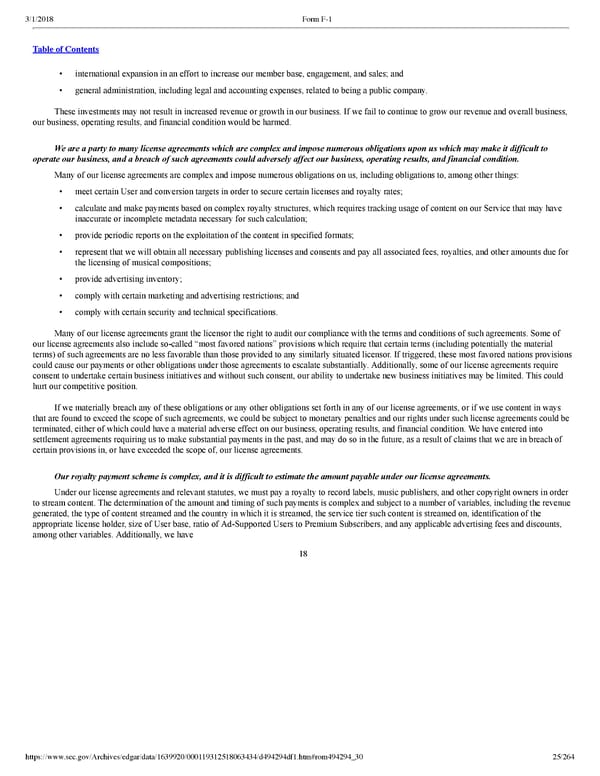25/264 • international expansion in an effort to increase our member base, engagement, and sales; and • general administration, including legal and accounting expenses, related to being a public company. These investments may not result in increased revenue or growth in our business. If we fail to continue to grow our revenue and overall business, our business, operating results, and financial condition would be harmed. We are a party to many license agreements which are complex and impose numerous obligations upon us which may make it difficult to operate our business, and a breach of such agreements could adversely affect our business, operating results, and financial condition. Many of our license agreements are complex and impose numerous obligations on us, including obligations to, among other things: • meet certain User and conversion targets in order to secure certain licenses and royalty rates; • calculate and make payments based on complex royalty structures, which requires tracking usage of content on our Service that may have inaccurate or incomplete metadata necessary for such calculation; • provide periodic reports on the exploitation of the content in specified formats; • represent that we will obtain all necessary publishing licenses and consents and pay all associated fees, royalties, and other amounts due for the licensing of musical compositions; • provide advertising inventory; • comply with certain marketing and advertising restrictions; and • comply with certain security and technical specifications. Many of our license agreements grant the licensor the right to audit our compliance with the terms and conditions of such agreements. Some of our license agreements also include socalled “most favored nations” provisions which require that certain terms (including potentially the material terms) of such agreements are no less favorable than those provided to any similarly situated licensor. If triggered, these most favored nations provisions could cause our payments or other obligations under those agreements to escalate substantially. Additionally, some of our license agreements require consent to undertake certain business initiatives and without such consent, our ability to undertake new business initiatives may be limited. This could hurt our competitive position. If we materially breach any of these obligations or any other obligations set forth in any of our license agreements, or if we use content in ways that are found to exceed the scope of such agreements, we could be subject to monetary penalties and our rights under such license agreements could be terminated, either of which could have a material adverse effect on our business, operating results, and financial condition. We have entered into settlement agreements requiring us to make substantial payments in the past, and may do so in the future, as a result of claims that we are in breach of certain provisions in, or have exceeded the scope of, our license agreements. Our royalty payment scheme is complex, and it is difficult to estimate the amount payable under our license agreements. Under our license agreements and relevant statutes, we must pay a royalty to record labels, music publishers, and other copyright owners in order to stream content. The determination of the amount and timing of such payments is complex and subject to a number of variables, including the revenue generated, the type of content streamed and the country in which it is streamed, the service tier such content is streamed on, identification of the appropriate license holder, size of User base, ratio of AdSupported Users to Premium Subscribers, and any applicable advertising fees and discounts, among other variables. Additionally, we have 18
 Spotify F1 | Interactive Prospectus Page 24 Page 26
Spotify F1 | Interactive Prospectus Page 24 Page 26